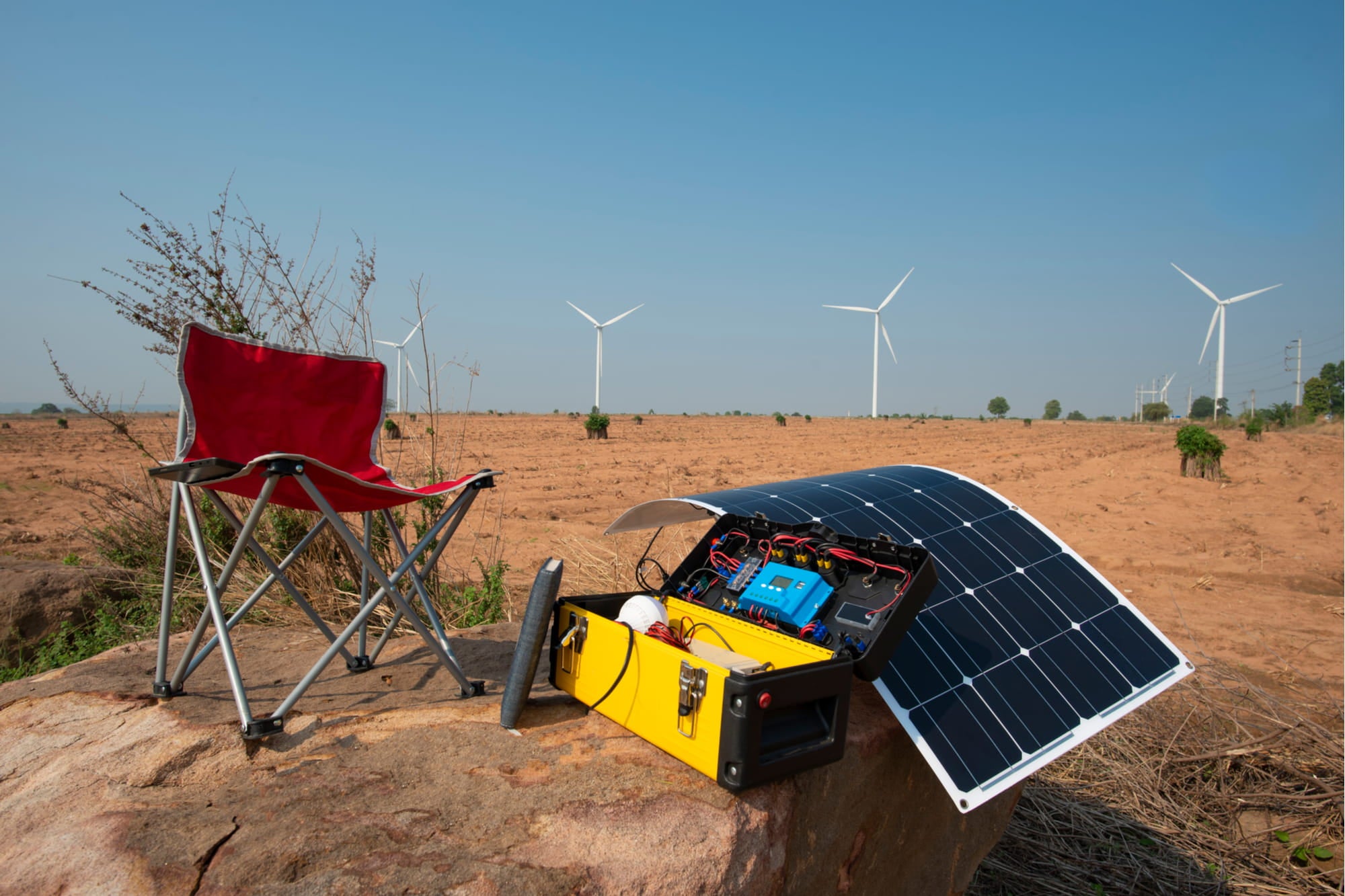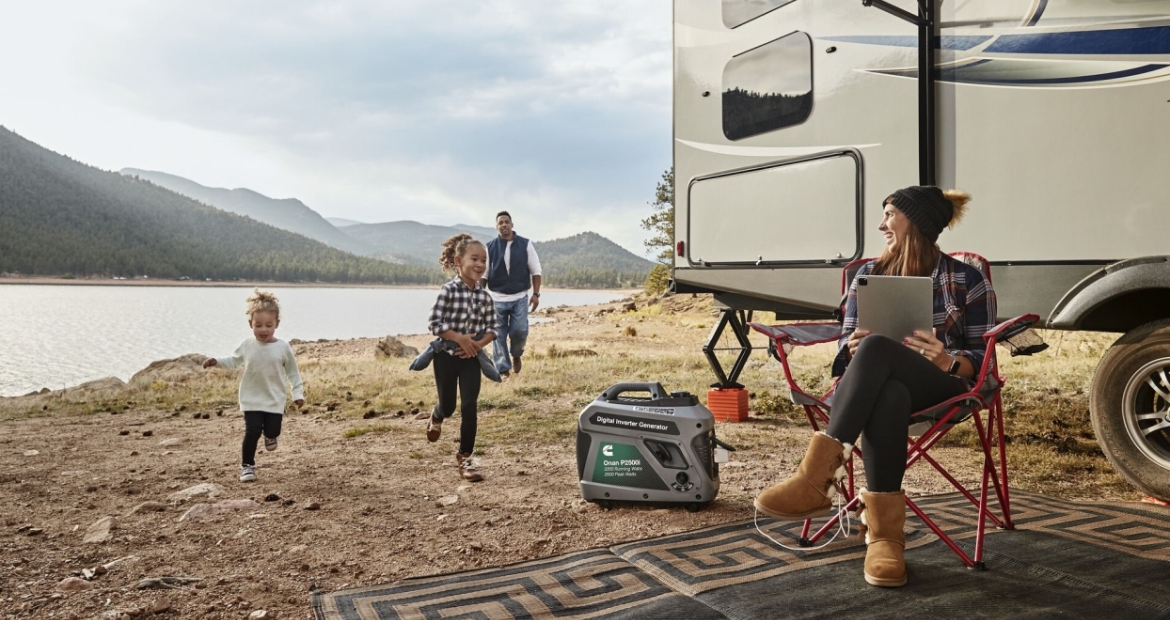Disclosure: This post contains affiliate links and I will be compensated if you make a purchase after clicking through my links. Learn More
Generators can be noisy, disrupting the peace of camping. To quiet a generator, follow these steps for a peaceful camping experience.
Camping is all about enjoying nature, but a loud generator can spoil the tranquility. Whether you’re using it to power lights, cook food, or charge devices, a noisy generator can be a nuisance. Luckily, there are effective ways to reduce the noise.
From simple DIY solutions to investing in quieter models, you can make your camping experience more serene. In this guide, we’ll explore practical methods to quiet your generator, ensuring you and fellow campers can enjoy the sounds of nature. By the end, you’ll have the tools to maintain a calm and quiet campsite.
Choosing The Right Generator
Choosing the right generator for your camping trip is crucial if you want to enjoy peace and quiet in the great outdoors. The type of generator you pick can make a big difference in both noise levels and convenience. Let’s dive into some important factors to consider.
Portable Vs. Inverter Generators
When it comes to camping, you’ll likely be choosing between portable and inverter generators. Portable generators are usually bigger and louder, but they offer more power. This is great if you’re running multiple appliances.
Inverter generators, on the other hand, are quieter and more efficient. They adjust their engine speed based on power demand, which means less noise. I remember the first time I used an inverter generator; I was amazed at how much quieter it was compared to my old portable one.
Noise Level Ratings
One of the most important aspects to consider is the noise level rating. Generators come with a decibel (dB) rating that indicates how loud they are. Lower dB ratings mean quieter operation.
For a peaceful camping experience, look for generators with noise levels below 60 dB. This is roughly the sound of a normal conversation. Imagine sitting by the campfire, talking with friends, and barely noticing your generator running in the background.
Have you ever had to shout over a noisy generator? It’s not fun. Choosing a generator with a low noise rating can make all the difference in your camping experience.
So, what kind of generator will you choose for your next camping trip? Think about the noise levels and the type of generator that fits your needs. Your peaceful camping experience could depend on it.
Proper Placement
When you’re camping, the last thing you want is the constant hum of a generator disrupting your peace. Proper placement of your generator can significantly reduce the noise levels, making your outdoor experience more enjoyable. Here’s how you can strategically position your generator to keep the noise at bay.
Distance From Campsite
One of the simplest ways to reduce generator noise is to place it as far from your campsite as possible. The further away the generator, the less noticeable the noise. Ideally, aim for at least 20 feet of distance.
When I went camping last summer, I noticed a huge difference when I moved my generator from 10 feet to 30 feet away. The noise was much less intrusive, and I could enjoy the sounds of nature. Try it out and see how much of a difference it makes for you.
Using Natural Barriers
Another effective method is using natural barriers to block the sound. Trees, bushes, and even hills can serve as excellent noise dampeners. Position your generator behind these natural barriers to minimize the sound that reaches your campsite.
During one camping trip, I placed my generator behind a thick cluster of bushes. The difference was remarkable. The noise was significantly reduced, and it didn’t disturb our conversations or sleep. Have you ever tried using natural barriers to block noise?
Proper placement can transform your camping experience. By considering the distance and using natural barriers, you can enjoy the serenity of the outdoors without the constant hum of a generator. Give these tips a try and notice the difference for yourself.
Soundproofing Techniques
Camping with a generator can be convenient, but the noise can disrupt the peace. Understanding soundproofing techniques can help you enjoy a quieter camping experience. This section explores practical methods to reduce generator noise.
Acoustic Enclosures
Acoustic enclosures are a great way to minimize generator noise. These are boxes designed to absorb and block sound. You can purchase pre-made enclosures or build one yourself. Use materials like mass-loaded vinyl or acoustic foam. Ensure the enclosure has proper ventilation to prevent overheating.
Diy Soundproofing Materials
DIY soundproofing can be cost-effective and fun. Start with basic materials like blankets, foam panels, or plywood. Wrap the generator in blankets or place foam panels around it. Plywood can create barriers to block sound. Combine these materials for better results. Remember to keep airflow in mind to avoid overheating.

Credit: thedyrt.com
Maintenance Tips
Reducing generator noise while camping can enhance your outdoor experience. Use soundproof mats and enclosures to dampen the noise. Regular maintenance ensures quieter operation and longevity.
Camping is a fantastic way to escape the hustle and bustle of daily life and reconnect with nature. However, a noisy generator can quickly disrupt the tranquility. By following some simple maintenance tips, you can ensure your generator runs smoothly and quietly during your camping trips.
###
Regular Oil Changes
Regular oil changes are crucial for maintaining your generator’s efficiency and reducing noise. When the oil becomes dirty, it can cause the generator to work harder and produce more noise.
Change the oil according to the manufacturer’s recommendations. This is usually every 50-100 hours of operation.
Using high-quality oil can also make a difference. Synthetic oils often provide better lubrication, which helps the generator run more quietly.
###
Clean Air Filters
Clean air filters are essential for your generator’s performance and noise reduction. Dirty or clogged air filters restrict airflow, making the generator louder and less efficient.
Check the air filter regularly, especially before a camping trip. If it looks dirty, clean it or replace it.
A clean filter allows the engine to breathe better, which helps it run quieter. It also improves fuel efficiency, saving you money and making your camping experience more enjoyable.
Have you ever noticed how your car runs smoother after a tune-up? The same principle applies to your generator. Regular maintenance can turn a noisy generator into a quiet companion for your camping adventures.
What are your best tips for keeping your generator quiet on camping trips? Share your experiences in the comments below!
Exhaust System Modifications
Camping with a generator can be noisy. A loud generator can disturb the peace of the campsite. Luckily, you can make your generator quieter. One effective way is by modifying the exhaust system. This method helps reduce noise significantly. Here are some ways to modify your generator’s exhaust system.
Upgrading Mufflers
Upgrading the muffler can help reduce noise. Stock mufflers are not always the best. Consider getting a high-quality muffler. These are designed to dampen sound better. Look for mufflers made for quiet operation. Install it properly to ensure the best results.
Adding Exhaust Extensions
Adding exhaust extensions can also reduce noise. These extensions direct exhaust away from the campsite. The sound moves further away, making it quieter. Choose an extension that fits your generator. Make sure it is secure and stable. This simple modification can make a big difference.

Credit: www.cummins.com
Using Noise-reducing Accessories
When you’re out camping, the last thing you want is a noisy generator disrupting the peace. One effective way to reduce generator noise is by using noise-reducing accessories. These tools can significantly lower the sound levels, making your outdoor experience more enjoyable. Let’s dive into some practical accessories you can use to quiet your generator.
Anti-vibration Pads
Anti-vibration pads are a game-changer. They help absorb the vibrations from your generator, which in turn, reduces noise. Imagine placing your generator on a soft cushion rather than directly on hard ground. This simple addition can make a noticeable difference.
I once camped near a family who used these pads under their generator. The difference was clear. Their setup was much quieter compared to others without pads. If you haven’t tried them, it’s worth the investment.
Anti-vibration pads are easy to use. Place them under the generator’s feet. They are usually made of rubber or a similar material. They’re small, portable, and don’t take up much space in your gear.
Noise Reduction Covers
Noise reduction covers are another useful accessory. They encase the generator, helping to muffle the sound. Think of them as a cozy blanket for your generator. These covers are designed to block and absorb noise, keeping the sound levels down.
Consider getting a cover specifically made for your generator model. This ensures a snug fit and optimal noise reduction. In my experience, the sound difference is remarkable. It’s quieter and less intrusive, making your camp evenings more pleasant.
Remember, proper ventilation is key. Make sure the cover has enough openings to avoid overheating. Safety first!
Using these accessories can make a huge difference in your camping experience. So, what’s stopping you from trying them out? Are there other noise-reducing tools you’ve found effective?
Alternative Power Sources
Generators can be noisy. This noise can disturb the peace while camping. Alternative power sources can help. They are quieter and eco-friendly. Let’s explore some options.
Solar Panels
Solar panels harness the sun’s energy. They are silent and efficient. During the day, they store power. This power can be used at night. Solar panels are portable. They are easy to set up. No fuel is needed. Just sunlight. They are perfect for long camping trips.
Battery Packs
Battery packs are another quiet option. They store electricity for later use. Charge them before your trip. They can power small devices. LED lights and phones, for example. Some battery packs are solar-compatible. They are compact and easy to carry. No noise, no fumes. Just clean energy.

Credit: www.multivu.com
Respecting Campground Etiquette
Respecting campground etiquette is crucial when using a generator while camping. Many campers cherish the peace and quiet of nature. Being considerate of others ensures everyone has a pleasant experience. Here are some key points to keep in mind.
Quiet Hours
Most campgrounds have designated quiet hours. These usually fall during the night. Make sure to turn off your generator during these times. It helps maintain a peaceful environment for everyone.
Generator-free Zones
Some campgrounds have areas where generators are not allowed. These zones offer a quieter setting for campers. Check the campground map or rules for such areas. Set up your camp accordingly.
Frequently Asked Questions
How To Make A Generator Quiet For Camping?
Place the generator on a soft surface, use a soundproof enclosure, and install a muffler. Keep the generator away from the campsite.
Do Generator Silencers Work?
Yes, generator silencers work. They reduce noise by muffling the sound produced by the generator’s exhaust system. This makes the environment quieter and more comfortable.
Can You Build A Box Around A Generator To Make It Quieter?
Yes, you can build a box around a generator to reduce noise. Use soundproof materials and ensure proper ventilation.
What Is The Acceptable Noise Level For A Generator For Camping?
The acceptable noise level for a camping generator is typically between 50 to 65 decibels. This ensures a quieter, more enjoyable camping experience.
Final Words
Quieting a generator for camping can be simple and effective. Use soundproof boxes or enclosures. Place the generator on soft surfaces. Regular maintenance helps reduce noise. Always choose a quiet model for camping. Enjoy a peaceful outdoor experience. Your fellow campers will appreciate it.
A quieter generator means better relaxation. Try these tips for a serene adventure. Happy camping!








